master
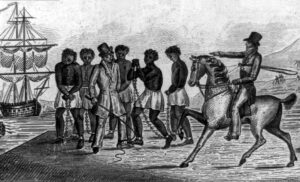
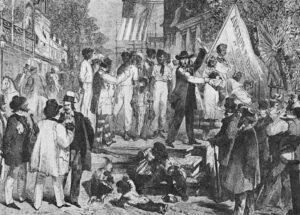 The years of slavery were awful for the African people who were sold into slavery by their own families or their countrymen. They were often stolen in the middle of the night, never to be in their homes again. Some of these slaves were young…some were even children. The terror must have been horrific. Nevertheless, it was what it was. Their life as they knew it was over. The journey to their new “home” was a hard one, and many people didn’t make it. That didn’t matter either, except in the revenue lost…they cared about that.
The years of slavery were awful for the African people who were sold into slavery by their own families or their countrymen. They were often stolen in the middle of the night, never to be in their homes again. Some of these slaves were young…some were even children. The terror must have been horrific. Nevertheless, it was what it was. Their life as they knew it was over. The journey to their new “home” was a hard one, and many people didn’t make it. That didn’t matter either, except in the revenue lost…they cared about that.
When the slaves arrived in the colonies, they didn’t have last names, or if they did, no one could really understand the last names. That didn’t matter to the slave sellers or the new master, because once sold, the slaves were given the last name of their masters, if they were given one at all. They were non-people. One must also understand that not all slaves were African. Many slaves came from Ireland too, but
I suppose it was easier to get away from their masters, because they were white too…not that they escaped, because where would they go. They were far away from their home too.
In those days, in Colonial America, slaves could win their freedom through lawsuits. I’m not sure what made them think they had a chance of winning their freedom. First of all, they had no money to get an attorney, and no attorney would have taken the case anyway. They had no way of proving their case, and what would their case have been? There was no code of conduct when it came to slaves. They could be beaten, raped, and even killed by their master. They could be overworked, under fed, and punished at will. There really was no case that could be made…as far as I can see anyway. As I said, there was a slim chance that a slave could bring a case, and even less chance that case. Nevertheless, even with that low chance of succeeding, winning in court meant 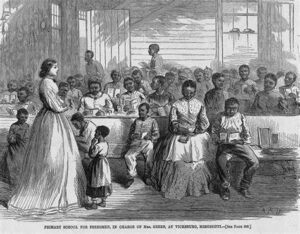
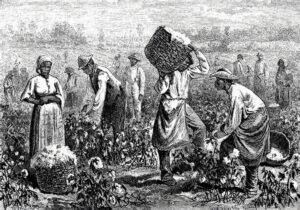 that the slave was now a citizen. They were free, and no one could dispute that again…legally anyway. The problem now was that these slaves had no last name, and they needed a last name to be a citizen. I seriously doubt they wanted to keep their master’s name. So, to solve the problem, the slaves were given the surname…Freeman. In my genealogist’s mind, there is no greater was to lose the true line of a family than such a name change.
that the slave was now a citizen. They were free, and no one could dispute that again…legally anyway. The problem now was that these slaves had no last name, and they needed a last name to be a citizen. I seriously doubt they wanted to keep their master’s name. So, to solve the problem, the slaves were given the surname…Freeman. In my genealogist’s mind, there is no greater was to lose the true line of a family than such a name change.
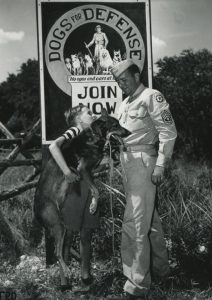 Most of us think of dogs as pets, and so they are, but they are so much more. Dogs know when their master is sick, lonely, or worried. Dogs ask little of their masters, and give so much back, but there is a group of dogs who are working dogs. In fact, we often see dogs in everyday life and think little of their presence, when in fact, their work is vital to those they work for. One of the most well known working dog groups is the K-9 Units. We think of these dogs as police dogs, and so they are, but originally, the K-9 Corps were founded in World War II. Of course, dogs were used long before that war, but not in the capacity of World War II.
Most of us think of dogs as pets, and so they are, but they are so much more. Dogs know when their master is sick, lonely, or worried. Dogs ask little of their masters, and give so much back, but there is a group of dogs who are working dogs. In fact, we often see dogs in everyday life and think little of their presence, when in fact, their work is vital to those they work for. One of the most well known working dog groups is the K-9 Units. We think of these dogs as police dogs, and so they are, but originally, the K-9 Corps were founded in World War II. Of course, dogs were used long before that war, but not in the capacity of World War II.
The Romans used dogs in battles, sending them in to attack the enemy. Native Americans used them as pack animals, as well as sentry animals. Even in the Middle Ages, dogs were sent into battle equipped with their own armor. Modern European societies had long established traditions of using dogs in war. But, I think that their use was probably made most famous 77 years ago, when in January of 1942, Dogs for Defense, Inc. was established as a national organization to help procure dogs for war training purposes. Although some dogs were acquired through purchase, it was largely through the dog owner population’s patriotic sentiments that most dogs were acquired for training. That really amazes me. I understand patriotism, and how people would volunteer in the service, but it seems strange to me to volunteer your dog. 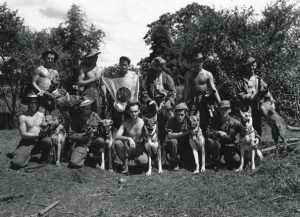 Nevertheless, they did. It was the job of Dogs For Defense not only to procure the dogs, but also to train them. Once trained, the dogs were to be given to the Quartermaster General, who then turned them over to the Plant Protection Branch and Inspection Division. Many thought the primary use of dogs would be as sentries for civilian war plants and quartermaster depot, but dogs have proven to be a much more.
Nevertheless, they did. It was the job of Dogs For Defense not only to procure the dogs, but also to train them. Once trained, the dogs were to be given to the Quartermaster General, who then turned them over to the Plant Protection Branch and Inspection Division. Many thought the primary use of dogs would be as sentries for civilian war plants and quartermaster depot, but dogs have proven to be a much more.
There are dogs that can sniff out drugs, gun powder…and the enemy. The DFD trained over 10,000 dogs. Most of the dogs were used at home for sentry duty, however, more than 1,800 dogs were sent into combat starting in 1942. The US Marine Corps sent over 1,000 dogs to be trained at their Camp Lejeune facility. Unfortunately, many commanders were unfamiliar, and maybe a little distrusting of the dogs, and didn’t know how to use them to their advantage. Seven Quartermaster Corps War Dog Platoons were sent to the European Theatre of Operations, but they did not have much success, probably due mostly to the lack of training with their handlers. In 1943, the QMC sent a detachment of six scout dogs and two messenger dogs to operate in the 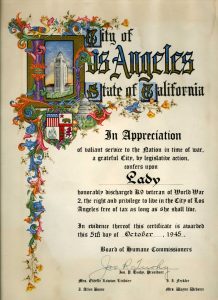 Pacific Theatre. This was a test of their value in combat conditions. The Japanese troops had deeply entrenched themselves on many islands in the Pacific theater of operations. Thousands were hiding in caves and in the dense jungles. They would lie very still, in wait for patrolling Marines and soldiers and then ambush them before the troops ever detected enemy forces. This is where the dogs proved their value. The first war dog platoons took to the Pacific island of New Britain. Here Marine war dogs attached to the Sixth Army first worked on sentry duty. Once a beachhead was established the dogs and handlers began conducting their patrols. They went on forty-eight patrols in fifty-three days. The dog patrols captured or killed 200 Japanese soldiers. This early success of war dog platoons set the standard for what could be expected, and what could not, from a K-9 detachment. I think that the more training given to both dogs and handlers, the better the results will be, as we have seen in K-9 police dogs in modern times.
Pacific Theatre. This was a test of their value in combat conditions. The Japanese troops had deeply entrenched themselves on many islands in the Pacific theater of operations. Thousands were hiding in caves and in the dense jungles. They would lie very still, in wait for patrolling Marines and soldiers and then ambush them before the troops ever detected enemy forces. This is where the dogs proved their value. The first war dog platoons took to the Pacific island of New Britain. Here Marine war dogs attached to the Sixth Army first worked on sentry duty. Once a beachhead was established the dogs and handlers began conducting their patrols. They went on forty-eight patrols in fifty-three days. The dog patrols captured or killed 200 Japanese soldiers. This early success of war dog platoons set the standard for what could be expected, and what could not, from a K-9 detachment. I think that the more training given to both dogs and handlers, the better the results will be, as we have seen in K-9 police dogs in modern times.
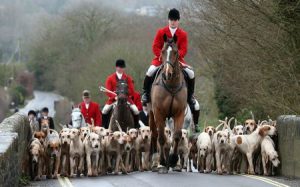 There is a tradition in England and a few other nations like Canada and Ireland, that takes place the day after Christmas, called Boxing Day. It is an odd name for a holiday, but I think the purpose of the holiday far outweighs the name of the holiday. People might argue the original purpose of the holiday, but the most straightforward answer as to what it is about would be that, “We are a little greedy here in the England and Ireland in wanting a more extended holiday. It is not enough for us to have only Christmas Day celebrations, we have added to this another event called Boxing Day.” That might be one part of the picture, but the full answer is not that simple. But firstly, it has nothing to do with the sport of boxing.
There is a tradition in England and a few other nations like Canada and Ireland, that takes place the day after Christmas, called Boxing Day. It is an odd name for a holiday, but I think the purpose of the holiday far outweighs the name of the holiday. People might argue the original purpose of the holiday, but the most straightforward answer as to what it is about would be that, “We are a little greedy here in the England and Ireland in wanting a more extended holiday. It is not enough for us to have only Christmas Day celebrations, we have added to this another event called Boxing Day.” That might be one part of the picture, but the full answer is not that simple. But firstly, it has nothing to do with the sport of boxing.
Boxing Day is a national Bank Holiday. It is a day to spend with family and friends and to eat up all the leftovers of Christmas Day, but there is more to it than that. The origins of the day are filled with history and tradition. People have long disputed the origins of the name Boxing Day. The name is actually a reference to holiday gifts. A “Christmas Box” in Britain is a name for a Christmas present. Boxing Day was traditionally a day off for the servants and the day when they received a “Christmas Box” from the master. The servants would also go home on Boxing Day to give “Christmas Boxes” to their families.
Traditionally, a box to collect money for the poor was placed in churches on Christmas day. The boxes were  opened the next day…Boxing Day. The name refers to a nautical tradition. Great sailing ships when setting sail would have a sealed box containing money on board for good luck. Were the voyage a success, the box was given to a priest, opened at Christmas and the contents then given to the poor. Boxing Day is the 26th December is a national holiday in England and Ireland.
opened the next day…Boxing Day. The name refers to a nautical tradition. Great sailing ships when setting sail would have a sealed box containing money on board for good luck. Were the voyage a success, the box was given to a priest, opened at Christmas and the contents then given to the poor. Boxing Day is the 26th December is a national holiday in England and Ireland.
Boxing Day is a time to spend with family or friends, but usually not those seen on Christmas Day itself. In recent times, the day has begun to include many sports. Horse racing is particularly popular with meets all over the country. Many top football teams also play on Boxing Day. Boxing Day is a time when the British show their eccentric side by taking part in all kinds of silly activities. Bizarre traditions include swimming the icy cold English Channel, fun runs, and charity events. Until 2004, Boxing Day hunts were a traditional part of the day, but the ban on fox hunting has put an end to this in its usual sense. Hunters will still gather dressed resplendently in red hunting coats to the sound of the hunting horn. But, since it is now forbidden to chase the fox with dogs, they now follow artificially laid trails.
Another “sport” to emerge in recent years is shopping. Sadly, what was once a day of relaxation and family time sees the start of the sales. Sales used to start in January, post-New Year, but the desire to grab a bargain and for shops to off-load stock means many now begin on Boxing Day. This tradition makes me especially sad, because it is like Black Friday. By moving Black Friday shopping to Thanksgiving, and now post Christmas sales to Boxing Day, have soured many people to shopping on these days, and the whole purpose is defeated.

In Ireland, Boxing Day is also known as “Saint Stephen’s Day” named after the Saint stoned to death for believing in Jesus. In Ireland on Boxing, there was once a barbaric act carried out by the so-called “Wren Boys.” These boys would dress up and go out, and stone wren birds to death then carry their catch around the town knocking on doors and asking for money, the stoning representing what had happened to Saint Stephen. This terrible tradition has now stopped, thank goodness, but the Wrens Boys still dress up. Now, instead they parade around town and collect money for charity. I’m thankful that such a barbaric tradition, has now taken on a new look, and is now used for good.
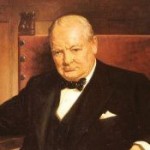 On this day, January 24, 1965, my 15th cousin once removed, Winston Leonard Spencer Churchill passed away. As an eight year old girl, his passing had little impact on my life…then. I wasn’t even aware that he was my cousin, that he had passed away, or of the impact his life had on the people of the world. I especially had no knowledge that as his cousin, I might have been in line for part of his estate, but I was in line for part of it, nevertheless.
On this day, January 24, 1965, my 15th cousin once removed, Winston Leonard Spencer Churchill passed away. As an eight year old girl, his passing had little impact on my life…then. I wasn’t even aware that he was my cousin, that he had passed away, or of the impact his life had on the people of the world. I especially had no knowledge that as his cousin, I might have been in line for part of his estate, but I was in line for part of it, nevertheless.
Of course, in the end, that portion of his estate went to England. From what I am able to gather, Winston Churchill expressed a desire to divide his estate among all of his living relatives…all of them, and believe me, there were a lot of them. The catch was that all of them had to be found or the money went to the state. With family members all over the world, that was a very tall order, and one that would prove fruitless…or at least too big for the task to be completed.
They found our family and the rest of my dad’s side of the family, but somewhere along the way, the search for Winston Churchill’s many family members dwindled to a dead end, and the portion of the estate that was to go to us, was lost to us forever. It’s strange that even then, I knew nothing of the man, the money, or the world-wide search that had taken place. Many have said that perhaps they didn’t search as hard as they should have, and others have said that the search was handled be a disinterested agency. Whatever the case may be, the search failed to find everyone it needed to locate, and that was the end of the story.
I seriously doubt if the money, no matter how substantial, carried a huge impact of the wealth of England or the English Crown. I don’t know how much would have gone to each of the many relatives who were living at that time. It may have been such an insignificant amount that it would have gone almost unnoticed…or maybe it would have been enough change the life of every one of them forever. We will never know, because we don’t know the amount, for sure, or how many would have benefitted from it.
In later years, after I learned of the strangeness of Winston Spencer Churchill’s will, and of his relationship to me, and my part in his will, I wondered why he would have written such a will. He must have known how hard it would be to carry out his last request. He must have assumed that the share each person would receive would be small, at best. So, why would he write such a will? I’m sure he had his reasons, and I am just as sure that we will never know them, but I have never stopped wondering. I’m sure people would think that I wonder about it, because I’m sorry I didn’t get a share of the money, but in reality, it is my opinion that money is a tool to get the things you need, and to bless those around you. All too often, when handed a large amount of  money with no understanding that happiness does not come as a side effect of having it, money ends up ruining the life of the person who received it. So does that mean that I’m against wealth…certainly not. I just think that money has a place, and it makes a great tool, but a terrible master.
money with no understanding that happiness does not come as a side effect of having it, money ends up ruining the life of the person who received it. So does that mean that I’m against wealth…certainly not. I just think that money has a place, and it makes a great tool, but a terrible master.
I have great respect for Winston Spencer Churchill. His abilities, especially in winning wars are well known. I don’t believe he was crazy when he wrote out his will either, but was maybe a man who felt that he could do some measure of good for those who were his family, and by requiring that all be found, he eliminated the ability to leave his inheritance to a chosen few…just in case they were tempted not to look further.
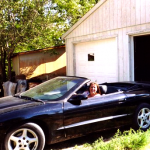 Driving home the other day, I started thinking about being in charge of such a machine as the automobile. At 15 years of age, most kids start learning to control this machine, and in a very short time, they are good at it. With the turn of a wheel and the press of a foot on a pedal, the car moves and the driver is in control. With careful and responsible use, the car can be maneuvered safely down life’s roads…and while driving it, we give little or no thought to just how amazing that is. A car is no small thing, and trucks are even bigger, and yet they are driven around by people who are pretty much one tenth of their size…sometimes less than that. Am I the only one who thinks about that?
Driving home the other day, I started thinking about being in charge of such a machine as the automobile. At 15 years of age, most kids start learning to control this machine, and in a very short time, they are good at it. With the turn of a wheel and the press of a foot on a pedal, the car moves and the driver is in control. With careful and responsible use, the car can be maneuvered safely down life’s roads…and while driving it, we give little or no thought to just how amazing that is. A car is no small thing, and trucks are even bigger, and yet they are driven around by people who are pretty much one tenth of their size…sometimes less than that. Am I the only one who thinks about that?
Before the invention of the automobile, people did control wagons and horse drawn carriages, but the horse had some say in what happened…at least to the extent that it wouldn’t usually go running off a cliff. And maybe 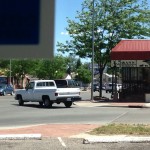 it wasn’t a good thing to have the horse involved exactly, because it could fight against the driver…unlike the automobile. Nevertheless, to have a machine that you have to control or it will go out of control, and to think that kids as young as fifteen are controlling that vehicle, is amazing and even mind boggling to me. And yet, it is being safely done every day.
it wasn’t a good thing to have the horse involved exactly, because it could fight against the driver…unlike the automobile. Nevertheless, to have a machine that you have to control or it will go out of control, and to think that kids as young as fifteen are controlling that vehicle, is amazing and even mind boggling to me. And yet, it is being safely done every day.
I’m not sure just why it sometimes hits me that driving a car every day is amazing, but it does. And when my kids and grandkids started driving, it seemed even more strange to me. How could they possibly know how to handle such a machine? They couldn’t possibly be ready or capable of such a thing, but the reality is that just like me, they were ready for it. There are approximately 30,000,000 drivers in the United States today, and if even a third of them are kids, there are about 10,000,000 kids driving their cars, and most generally keeping them in their own lane and on the road. I don’t say that driving a car is the safest way to travel, because like it  or not, that honor belongs to the airlines. Many people wouldn’t agree, but the numbers don’t lie.
or not, that honor belongs to the airlines. Many people wouldn’t agree, but the numbers don’t lie.
I know my thoughts sometimes seem a little odd, but the next time you get behind the wheel, contemplate for a moment just how amazing it is that you operate a piece of machinery that is about ten times your size and you do it while giving it almost no thought at all. I guess that our minds grasp many things, and driving a car doesn’t seem to be a particularly difficult one, since it is something we master at a relatively young age. A vehicle is a complicated piece of machinery with many things to master, but we have been doing it for a long time…truly amazing.

